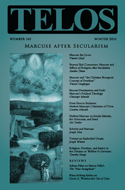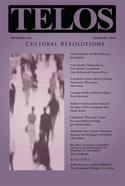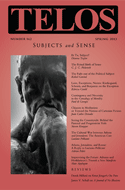By Robert Wyllie · Thursday, March 27, 2014 The following paper was presented at the Eighth Annual Telos Conference, held on February 15–16, 2014, in New York City.
Kierkegaard is the first to call modern Christians “pagans.” If Augustine’s critique of the Physicalists in the City of God was the last critique of ancient pagan time, Kierkegaard’s critique of our present “abstract infinity” is the first critique of modern pagan time. Augustine and Kierkegaard are like bookends on the complex sacred time of the Middle Ages.
Continue reading →
By Vincent Geoghegan · Monday, January 13, 2014 Vincent Geoghegan’s “Marcuse and ‘the Christian Bourgeois Concept of Freedom'” appears in Telos 165 (Winter 2013). Read the full version online at the Telos Online website, or purchase a print copy of the issue in our store.
 Current talk of the post-secular necessarily invites analysis of the nature of the secular, particularly its historical genesis and subsequent development. The task is to reject what Charles Taylor in A Secular Age has termed “subtraction stories” of the emergence of secularism, involving simplistic assumptions about the inexorable evaporation and attenuation of the religious, and instead understand the complex constitutive role religion has played in the construction of the secular. Marcuse’s work is of interest in this respect because beginning with his 1930s analysis of what he terms “the Christian bourgeois concept of freedom” within the Protestant Reformation, he explores the ways in which he believes modern secular society emerged out of Christianity. Current talk of the post-secular necessarily invites analysis of the nature of the secular, particularly its historical genesis and subsequent development. The task is to reject what Charles Taylor in A Secular Age has termed “subtraction stories” of the emergence of secularism, involving simplistic assumptions about the inexorable evaporation and attenuation of the religious, and instead understand the complex constitutive role religion has played in the construction of the secular. Marcuse’s work is of interest in this respect because beginning with his 1930s analysis of what he terms “the Christian bourgeois concept of freedom” within the Protestant Reformation, he explores the ways in which he believes modern secular society emerged out of Christianity.
Continue reading →
By Paolo Morisi · Friday, August 30, 2013 Paolo Morisi’s “Twentieth-Century British Christian Democratic Movements: The Search for a Political Space” appears in Telos 163 (Summer 2013). Read the full version online at the Telos Online website, or purchase a print copy of the issue in our store.
 One of the major British political anomalies vis-à-vis Europe is the lack of a Christian Democratic political party. In most European countries these parties are part of the political fabric of the nation, but in Britain Christian Democracy never developed into a party. Research has shown that during the twentieth century there were British groups that inspired by Catholic social thought were the closest approximation to Christian Democracy. They not only sought to influence the parties, but also introduced into domestic politics typical Christian Democratic concerns. Thus, this essay seeks to address the following questions: What were their aims and policies? How and in what ways did they influence the parties? What was their ideological outlook? Finally, were there ideological differences among these groups? One of the major British political anomalies vis-à-vis Europe is the lack of a Christian Democratic political party. In most European countries these parties are part of the political fabric of the nation, but in Britain Christian Democracy never developed into a party. Research has shown that during the twentieth century there were British groups that inspired by Catholic social thought were the closest approximation to Christian Democracy. They not only sought to influence the parties, but also introduced into domestic politics typical Christian Democratic concerns. Thus, this essay seeks to address the following questions: What were their aims and policies? How and in what ways did they influence the parties? What was their ideological outlook? Finally, were there ideological differences among these groups?
Continue reading →
By Russell A. Berman · Monday, June 24, 2013 Telos 163 (Summer 2013) is now available for purchase in our store.
 Profound change in society may involve shifting control of political power, the character of economic systems, or access to resources, but it can also have to do with the structures of meaning we bundle together in various understandings of culture. This issue of Telos looks at the explosive forces located specifically in the intangible dimensions of culture and how they may play out in revolutionary or counter-revolutionary processes. Profound change in society may involve shifting control of political power, the character of economic systems, or access to resources, but it can also have to do with the structures of meaning we bundle together in various understandings of culture. This issue of Telos looks at the explosive forces located specifically in the intangible dimensions of culture and how they may play out in revolutionary or counter-revolutionary processes.
Continue reading →
By Daniel Wong · Friday, June 21, 2013 The following paper was presented at the Seventh Annual Telos Conference, held on February 15–17, 2013, in New York City.
 Flush with optimism following the end of the Cold War, many American and European scholars openly speculated about the possibilities of a Kantian perpetual peace, returning with renewed vigor to theories of cosmopolitanism. As Amanda Anderson has put it, such cosmopolitanism “endorses reflective distance from one’s cultural affiliations, a broad understanding of other cultures and customs, and a belief in universal humanity.” Indeed, recent developments in communication technology, combined with a proliferation of transnational migrations, have made it possible to truly imagine and experience “navigating beyond one’s state.” Flush with optimism following the end of the Cold War, many American and European scholars openly speculated about the possibilities of a Kantian perpetual peace, returning with renewed vigor to theories of cosmopolitanism. As Amanda Anderson has put it, such cosmopolitanism “endorses reflective distance from one’s cultural affiliations, a broad understanding of other cultures and customs, and a belief in universal humanity.” Indeed, recent developments in communication technology, combined with a proliferation of transnational migrations, have made it possible to truly imagine and experience “navigating beyond one’s state.”
Continue reading →
By Luciano Pellicani · Thursday, April 4, 2013 Luciano Pellicani ‘s “The Cultural War between Athens and Jerusalem: The American Case” appears in Telos 162 (Spring 2013). Read the full version online at the Telos Online website, or purchase a print copy of the issue in our store.
 Despite what Harold Berman claimed, the writers of the American Constitution were not inspired by strong religious convictions. On the contrary, as typical men of the Enlightenment they were severe critics of Christianity, considering it an obscurantist and intolerant tradition in all its versions. Hence their cultural battle to achieve the institutionalization of what Thomas Jefferson called “the wall of separation between State and Church” that would guarantee the greatest religious freedom. A freedom that was periodically threatened by fundamentalist movements which, in the name of Jerusalem, sought—and still seek—to establish a confessional state governed by the truth revealed in the Bible whereas the founding fathers hoped that “what Athens was in miniature, America will be in magnitude.” It is not true that America was born modern and progressive, as Ernest Gellner has maintained. It became so through the cultural war between Athens and Jerusalem that began in the eighteenth century and is still in progress. Despite what Harold Berman claimed, the writers of the American Constitution were not inspired by strong religious convictions. On the contrary, as typical men of the Enlightenment they were severe critics of Christianity, considering it an obscurantist and intolerant tradition in all its versions. Hence their cultural battle to achieve the institutionalization of what Thomas Jefferson called “the wall of separation between State and Church” that would guarantee the greatest religious freedom. A freedom that was periodically threatened by fundamentalist movements which, in the name of Jerusalem, sought—and still seek—to establish a confessional state governed by the truth revealed in the Bible whereas the founding fathers hoped that “what Athens was in miniature, America will be in magnitude.” It is not true that America was born modern and progressive, as Ernest Gellner has maintained. It became so through the cultural war between Athens and Jerusalem that began in the eighteenth century and is still in progress.
Continue reading →
|
|
 Current talk of the post-secular necessarily invites analysis of the nature of the secular, particularly its historical genesis and subsequent development. The task is to reject what Charles Taylor in A Secular Age has termed “subtraction stories” of the emergence of secularism, involving simplistic assumptions about the inexorable evaporation and attenuation of the religious, and instead understand the complex constitutive role religion has played in the construction of the secular. Marcuse’s work is of interest in this respect because beginning with his 1930s analysis of what he terms “the Christian bourgeois concept of freedom” within the Protestant Reformation, he explores the ways in which he believes modern secular society emerged out of Christianity.
Current talk of the post-secular necessarily invites analysis of the nature of the secular, particularly its historical genesis and subsequent development. The task is to reject what Charles Taylor in A Secular Age has termed “subtraction stories” of the emergence of secularism, involving simplistic assumptions about the inexorable evaporation and attenuation of the religious, and instead understand the complex constitutive role religion has played in the construction of the secular. Marcuse’s work is of interest in this respect because beginning with his 1930s analysis of what he terms “the Christian bourgeois concept of freedom” within the Protestant Reformation, he explores the ways in which he believes modern secular society emerged out of Christianity.  One of the major British political anomalies vis-à-vis Europe is the lack of a Christian Democratic political party. In most European countries these parties are part of the political fabric of the nation, but in Britain Christian Democracy never developed into a party. Research has shown that during the twentieth century there were British groups that inspired by Catholic social thought were the closest approximation to Christian Democracy. They not only sought to influence the parties, but also introduced into domestic politics typical Christian Democratic concerns. Thus, this essay seeks to address the following questions: What were their aims and policies? How and in what ways did they influence the parties? What was their ideological outlook? Finally, were there ideological differences among these groups?
One of the major British political anomalies vis-à-vis Europe is the lack of a Christian Democratic political party. In most European countries these parties are part of the political fabric of the nation, but in Britain Christian Democracy never developed into a party. Research has shown that during the twentieth century there were British groups that inspired by Catholic social thought were the closest approximation to Christian Democracy. They not only sought to influence the parties, but also introduced into domestic politics typical Christian Democratic concerns. Thus, this essay seeks to address the following questions: What were their aims and policies? How and in what ways did they influence the parties? What was their ideological outlook? Finally, were there ideological differences among these groups?  Flush with optimism following the end of the Cold War, many American and European scholars openly speculated about the possibilities of a Kantian perpetual peace, returning with renewed vigor to theories of cosmopolitanism. As Amanda Anderson has put it, such cosmopolitanism “endorses reflective distance from one’s cultural affiliations, a broad understanding of other cultures and customs, and a belief in universal humanity.” Indeed, recent developments in communication technology, combined with a proliferation of transnational migrations, have made it possible to truly imagine and experience “navigating beyond one’s state.”
Flush with optimism following the end of the Cold War, many American and European scholars openly speculated about the possibilities of a Kantian perpetual peace, returning with renewed vigor to theories of cosmopolitanism. As Amanda Anderson has put it, such cosmopolitanism “endorses reflective distance from one’s cultural affiliations, a broad understanding of other cultures and customs, and a belief in universal humanity.” Indeed, recent developments in communication technology, combined with a proliferation of transnational migrations, have made it possible to truly imagine and experience “navigating beyond one’s state.”  Despite what Harold Berman claimed, the writers of the American Constitution were not inspired by strong religious convictions. On the contrary, as typical men of the Enlightenment they were severe critics of Christianity, considering it an obscurantist and intolerant tradition in all its versions. Hence their cultural battle to achieve the institutionalization of what Thomas Jefferson called “the wall of separation between State and Church” that would guarantee the greatest religious freedom. A freedom that was periodically threatened by fundamentalist movements which, in the name of Jerusalem, sought—and still seek—to establish a confessional state governed by the truth revealed in the Bible whereas the founding fathers hoped that “what Athens was in miniature, America will be in magnitude.” It is not true that America was born modern and progressive, as Ernest Gellner has maintained. It became so through the cultural war between Athens and Jerusalem that began in the eighteenth century and is still in progress.
Despite what Harold Berman claimed, the writers of the American Constitution were not inspired by strong religious convictions. On the contrary, as typical men of the Enlightenment they were severe critics of Christianity, considering it an obscurantist and intolerant tradition in all its versions. Hence their cultural battle to achieve the institutionalization of what Thomas Jefferson called “the wall of separation between State and Church” that would guarantee the greatest religious freedom. A freedom that was periodically threatened by fundamentalist movements which, in the name of Jerusalem, sought—and still seek—to establish a confessional state governed by the truth revealed in the Bible whereas the founding fathers hoped that “what Athens was in miniature, America will be in magnitude.” It is not true that America was born modern and progressive, as Ernest Gellner has maintained. It became so through the cultural war between Athens and Jerusalem that began in the eighteenth century and is still in progress. 

